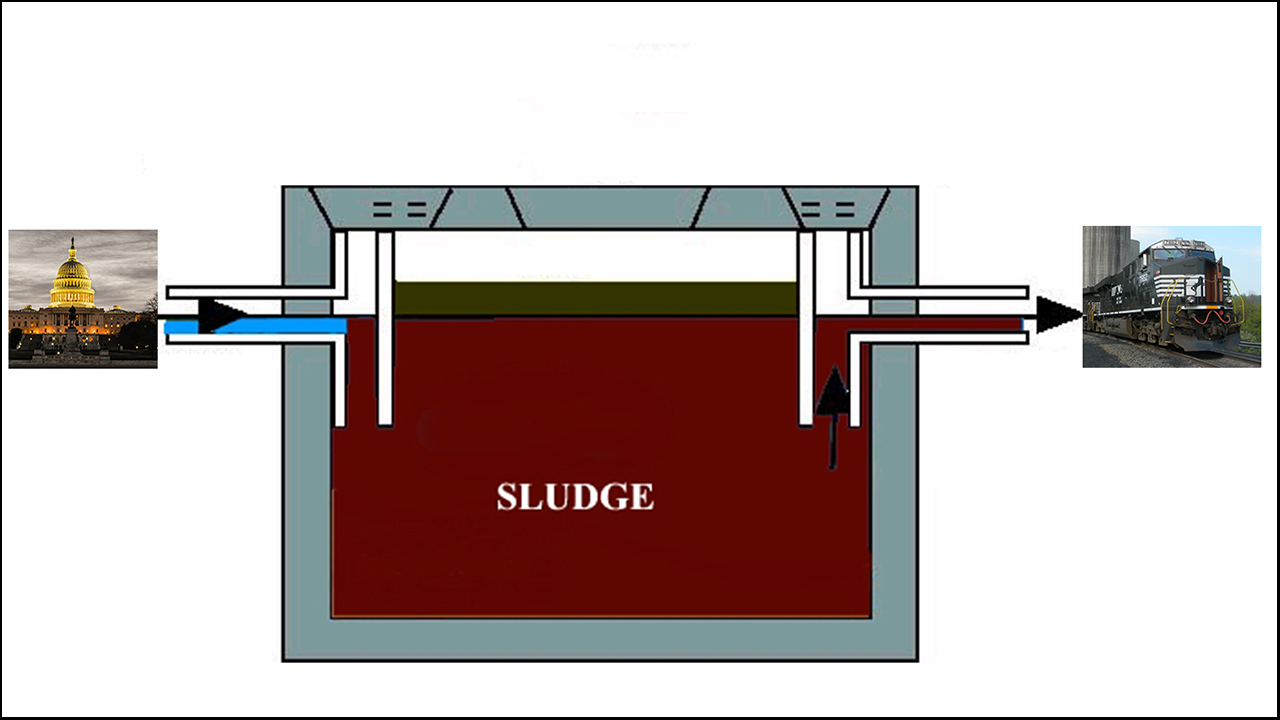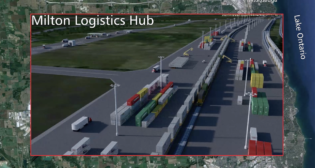
Cesspool of Political Partisanship
Written by William C. Vantuono, Editor-in-Chief
In the February issue, Contributing Editors Frank N. Wilner and Donald M. Itzkoff separately address all the policy and legislative challenges freight railroads face this year.
All these challenges are a 30,000-gallon hazmat tank car’s worth of spillover from 2023. They’re mixed with a few bottles’ worth of malodorous thioacetone (bad feelings) from the labor dispute of 2022, and infused with a dense, toxic political brain fog. Often, they’re accompanied by howling noises from self-righteous, gavel-pounding attention seekers who populate Capitol Hill hearings. Major news outlets have been adding to the feeding frenzy.
Even the U.S. Department of Transportation and Federal Railroad Administration have joined this “let’s trash the railroads” cacophonous chorus. Conveniently coinciding with the “first anniversary” of Norfolk Southern’s East Palestine accident, the Secretary of Transportation held a “media event” with the leaders of 13 rail unions with their said purpose of “calling out the blatant inaction of freight rail companies and Congress to address workers’ concerns and create actual safety reform. Leaders will also be diving into the concerns of the thousands of rail workers as rail companies continue lobbying to evade or weaken safety provisions in the face of the calls for increased regulations to protect workers and communities.”
I skipped the event because I knew what was going to be said: nothing new nor absolutely true, everything skewed, a twist of the screw. The following day, the chorus issued this statement:
“On this somber anniversary, rail labor leaders once again renew our calls for safety reforms. For years, workers have sounded the alarm about deadly safety conditions in the freight rail industry, and yet since the East Palestine disaster, rail companies have lobbied to evade or weaken safety provisions. The industry’s safety failures contribute to more than 1,000 freight train derailments a year—1,500 just since East Palestine. Congress must pass a comprehensive rail safety bill that addresses the issues rooted in the industry’s current operating practices. Absent these federal actions, rail corporations will keep choosing Wall Street over Main Street and rail safety will further deteriorate. To the East Palestine community: We will not forget what happened to you and we will not stop fighting to prevent it from happening to another community. Solidarity forever.”
This is purely political rhetoric, hypocritical hype full of cleverly crunched and spun numbers. It’s no more than a thinly disguised attempt on the part of union leadership (not the rank and file) to push for two-person crew legislation, which they’ve managed to resurrect and force-feed to the FRA (the Administrator was more than happy to oblige). It’s just another beautiful day in the Capitol Hill neighborhood (apologies to Mr. Rogers), where if there wasn’t something to protest, a protest would be launched against there being nothing to protest.
“It is troubling that the Transportation Secretary is playing a partisan role and politicizing railroad safety,” Frank Wilner comments. “When a rigorous, transparent and expert approach to transportation safety descends into a cesspool of political partisanship, the legitimacy of studies and proposed solutions loses all credibility and much public support, and only invites a countervailing and equally improper reaction when the Executive Branch comes under the ‘other’ political party. And FRA data isn’t broken down to separate fender benders and minor yard derailments from more serious incidents. Imagine the confusion, for example, if parking violations were lumped in with moving violations; or scrapes and bruises lumped in with life-threatening injuries. The fault lies with FRA providing on its web pages a most confusing jumble of statistics lacking clarity and simplified explanation.”

“National labor leaders and Norfolk Southern management are committing to work together to enhance rail safety for our people and the communities we serve. We won’t agree on everything. That’s okay. Our belief in the importance of safety unites us. We want our people to show up to work every day knowing their employer and their union are working diligently to help them do their jobs safely. We will collaborate, consult experts, review best practices, and listen to the people closest to the work. Working together—and broadening the conversation to ensure everyone plays a part—is the best way to achieve meaningful improvement. We will remain open-minded, nimble and fact-based, making changes as we learn. Along the way we will continue to look for other ways to collaborate to improve the quality of life for our colleagues.”
Seems rather hypocritical on labor’s part at this point, don’t you think?
Frank Wilner’s take: “As for rail labor reneging on its promise of cooperation, it indeed appears tied to a parochial objective of using political partisanship to mandate train crew size—a preferred objective to such a rule expected out of the FRA in March. Although the FRA Administrator, who has repeatedly demonstrated he is joined at the hip with rail labor, is behind the rule, its crucial benefit/cost analysis is so underwater that it is highly likely to be canceled by an impartial panel of federal appellate judges.”
17 YEARS AGO
This is deja vu all over again (thanks Yogi Berra). While perusing PDFs of past columns, I came across one that struck a chord. Seventeen years ago, in 2007, the industry was in the midst of tense labor negotiations and battling reregulation attempts. Sound familiar?
Early that year, a Class I manager who wished to remain anonymous sent me an opinion on why at least one rail union’s support of reregulation really didn’t make any sense. This sounds not-so-strangely familiar:
“The most curious element of efforts to re-regulate the rail industry is the support of some rail unions. They say that rail management is too concerned with profits to do all it can to improve safety.
“Anyone associated with rail management realizes that every safety failure costs money—but that it’s not proper to say so. It’s proper only to express concern for the pain and suffering of any individual who is injured and for their families. But the fact remains: Accidents cost money and reduce the opportunity to make a profit. Maybe this should be said out loud, often—especially around the investment community.
“How do accidents cost money? In pay or lost time. In repairs to or replacement of damaged property. All these costs are easily attributed to a specific incident. Less easily attributed, and often overlooked, are hidden costs—things like pay to workers near the accident who accomplish nothing while the investigation and cleanup occurs. When the railroad does not work smoothly, other areas don’t mesh. Crews outlaw, connections are missed, and people work overtime. Moneys are expended to ‘catch up,’ and service reliability takes a hit—which may cost the railroad future business.
“The mindset of some union officials and some management is to cause trouble for the other. We must all remember that this does not advance either safety or profitability. The only cheap accident is the one that doesn’t occur.”
Many long strides have been taken to improve life for this industry’s skilled, hard-working agreement employees, paid sick leave among the longest. To those of you in management and labor whose myopic mindset is about “causing trouble for the other,” stop swinging spike mauls at each other if you want to keep the predators off your railroad tracks. Instead, agree to disagree, respectfully (see joint NS/union leadership letter, above.)
Civil discourse is in short supply these days, and it’s only going to get worse. Let’s not add to the toxic fumes. We should be making sure we always have each other’s backs.
As for the Rail Safety Act, “The ignominy of public officials supporting this legislation is their acting ahead of the federal government’s designated expert agency—the National Transportation Safety Board, which has yet to issue a final report on the East Palestine accident,” comments Frank Wilner. “Neither principal Senate sponsor—Democrat Sherrod Brown nor Republican J.D. Vance—nor the Transportation Secretary and Federal Railroad Administrator, have even minimal education or career qualifications to second-guess NTSB investigators whose North Star is science as opposed to politics. Should lawmakers and political appointees honestly seek to assist in improving rail safety rather than epitomize shameless populists trolling for election-year rewards, there are some 200 outstanding or not fully resolved scientific-based NTSB recommendations related to rail safety and predating the East Palestine accident worthy of sunlight exposure.”
Adding to this mess, Norfolk Southern is now in the gunsights of yet another hedge fund. What do you think could happen if these “shareholder-value-driven” money manipulators take over the NS Board and send Alan Shaw and his team packing? Slash-and-burn? Crippled capex? Job cuts? Deferred maintenance? Do those of you in the chorus really want to keep up the attacks on the railroads, who employ all of your dues-paying members? You tell me.



